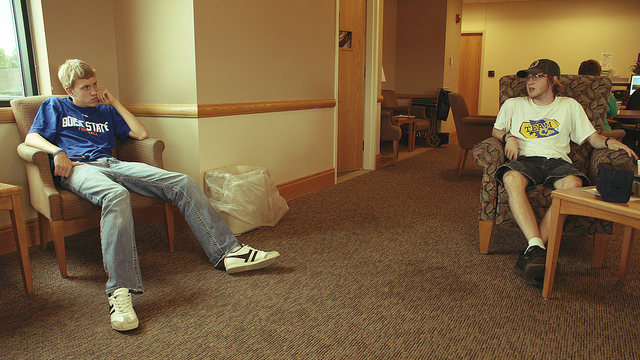Dear Lifehacker, I have a friend who who seems to have some issues that would benefit from seeing a mental health professional. How can I tell him this without being a jerk? Sincerely, Worried Wendy
Dear WW,
That’s a tough spot to be in, and your next move is important. You certainly can’t force your friend to do anything, but you can open up a helpful dialogue. To really dig into this question, we talked with Roger S. Gil, mental health professional trained in marriage and family therapy. Here’s the best way to approach that conversation.
Ask Yourself If You Should Even Try To Convince Them

Firstly, make sure you’re ready to intervene. Nobody likes being told what to do, but that’s especially the case if you’re not already really good friends. Likewise, they won’t be receptive to you if you don’t have a strong relationship with them. Gil points out that the closeness of your relationship is what matters most here:
It all depends on your relationship to the person. While we may be concerned about a coworker (for example), urging them to see someone won’t help if we don’t have a close enough relationship to them. Before asking someone to seek help, check how close you are to them first.
It sounds like common sense, but it’s still a good reminder. Make sure you have the type of relationship with a person where you can actually have this conversation before you go in headfirst and suggest what they do with their life.
Make Your Case

Once you decide to go ahead and try to persuade your friend to get help, it’s time to come up with a plan for that conversation. Gil has a few guidelines for how to handle that conversation:
- Try to use your relationship as leverage: Often times it’s easier to hear “seek professional help” from someone you know well than from a simple acquaintance. For example, you can assure them of how important the relationship is to you and follow it up with comments about how concerned their maladaptive behaviours make you for their wellbeing. A word of caution, be wary of using your relationship as leverage when giving them an ultimatum. You may find yourself in a precarious situation if you do.
- Identify the problematic behaviours in specific terms: Don’t say, “you always argue with people.” Say something like “when I heard about the arguments you had at work, it made me feel that this might be something you want to look into because you’ve said similar things to me about other relationships last week.” The point is to be specific and nonjudgmental.
- Identify how the specific behaviours are affecting the person and those around them: Being able to identify how a person’s specific problematic behaviour is adversely affecting others lets the person know that the issue is bigger than them.
- Identify strong points and positive qualities: It’s usually easier to start conversations about getting someone to seek help by pointing out what you like and admire about them.
It’s also important to make sure you’re level headed before you get into this conversation. Stay calm and offer your advice without coming off like a know-it-all. It’s a pretty thin line between being a cocky jerk and a helpful friend, so make sure you’re careful as you toe that line.
Offer To Help

You can persuade all you want, but if you’re not willing to actually help beyond talking, it’s a largely pointless exercise. Gil suggests you throw yourself out there and offer to go along with them to the first appointment:
If you’re close enough to the person, offer to sit in the waiting room during their first session or two. It’s also a good idea to mention that you won’t ask specifics about the session, just superficial things ( like “Did you like it?”, “Are you comfortable with this process?”, etc.).
Remember though, you’re just offering to help, don’t force yourself into the situation if they don’t want you there.
Prepare For Rejection

If you’re going to have this conversation with someone, prepare for it to possibly go off the rails. Regardless of how you approach the conversation or how good your relationship with the other person is, there’s a reasonable chance it’s going to go poorly. Gil suggests you prepare yourself for that:
Be prepared to get rejected or have the person mad at you. People have the right to make bad choices and to be offended even when you come at them with the best of intentions.
Rejection is a risk you’ll have to be willing to take, but if you prepare yourself to deal with getting yelled at and focus on the consequences, you should be able to make it through the conversation. Good luck.
Cheers
Lifehacker
Got your own question you want to put to Lifehacker? Send it using our [contact text=”contact form”].
Photos by Tristan Bowersox, Sarina Brady, Alan Turkus

Comments
2 responses to “Ask LH: How Can I Persuade Someone To Seek Professional Help?”
1) the context of the friendship might also be an input. A friend from work might be uncomfortable with someone from that environment making this case. Possible, if not having the correct relationship, might be able to make the case to someone else who has a different relationship with the person to discreetly pursue the possibility (while ideally not being seen to be conspiratorial).
2) I guess try and normalize it. It’s a little odd to encourage people to get therapy when cementing the stigma that has historically been associated with this. It’s kindof the difference between therapy being something people occasionally need in the normal course of life versus something that’s tantamount of an admission of something profoundly shameful.
This area is fraught with difficulty. I don’t see how a “mental health professional” can offer an opinion without clearly understanding the issue. For example, there will be a completely different approach for someone who is depressed, or someone who is delusional.
similar to physical wellbeing first aid,under mental health first aid the following approach is taught:
A assess for risk of suicide or harm to self or others
L listen non-judgementally. Employ active listening and don’t relate their situation to yours
G Give reassurance, support and information
E encourage them to seek appropriate professional support
E encourage seeking the support of others, peer support networks and other options.
like physical wellbeing first aid i would highly recommend undertaking a mental health first aid course. just to be a first line of support may just help someone someday through a fog they just need help steering through